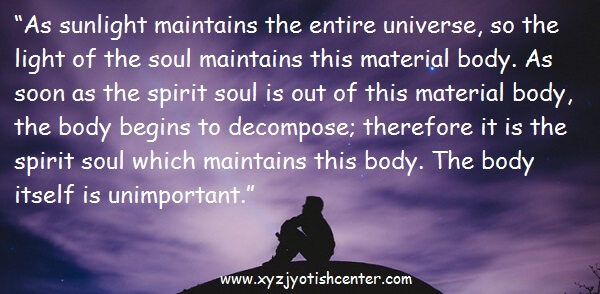“Enlightenment means taking full responsibility for your life.”
“No matter how bright your educational qualifications are, you continue to live in the dark, unless you are enlightened with the supreme knowledge of all the Vedic scriptures, the whole absolute truth.”
Among temporary and timeless state, there is only one factor of ‘Time’. As a matter of fact, everything is based on need. In reality, Earth is revolving around the Sun, but we perceive that the Sun and Moon are moving around the Earth, it is up to us only, how our mind perceives it.
In the spiritual aspect, Life, Enlightenment, (is the highest spiritual state that can be achieved.) etc. are basically a program running within the mind. In a very short, Jiva or a living organism is basically the composition of three different identities Soul-Mind-Matter, Soul is the spiritual or immaterial part of a human being or animal, regarded as eternal, Mind, The relation between soul and matter produces mind, the instrument of consciousness. So mind is the mediator, the relating factor between spirit and matter.
The mind is the bundle of thoughts, the mind which is always restless and constantly thinking of something or other, when controlled, a man can get some form of power. You agree with me that meditation is a discipline of thoughts and an awareness of Soul and that it is a system through which we can root out the individual anxieties, the unseen disorders and the tensions that are all around us in the physical, mental, emotional and spiritual bodies.
We are told that mind is the mediator between soul and body. Perhaps we can say that mind is also the mediator between spirit and matter that it is the middle way, the connecting link of the set of spirit-mind -matter. The soul is always blessed in the state of enlightenment.
But based on some Karmic Bondage, Soul connects with those rightly or wrongly marked memory impressions produced by the unnecessary thoughts of the Jiva that not experienced in the state of knowingness during past life or even in this life earlier. With these desire of seeds, it becomes Jivatma. This is how the cycle of birth and death is continuously going on.
Guru Granth Sahib (Holy Scripture) is the supreme power and true living Guru of the Sikhs. The Gurbani (message) that it contains was directly revealed by Akal Purakh (God) Himself through Guru Nanak Sahib for the whole of humanity to seek guidance and salvation from. It provides a true way of life, wisdom, spiritual awakening and enlightenment. Guru Granth Sahib is the embodiment of same Divine Light that resided in all the preceding Gurus. This is why it was given the status of Guru and Sikhs love it deeply.
Once, the mind gets free from its conditioning or reasoning, Jivatma and goes in Its Eternal State that is enlightenment. But this state is being possible only after cleaning these impressions from memory by experiencing it during his/her life. Enlightenment, Spiritual attainment is directly related to personal progress. Much depends on the amount of effort the devotee (disciple) puts in. Chanting /Meditation on “The Name”, joining the company of the Rishis, saints, performing virtuous or moral deeds all help one to progress on a spiritual plane. Strictly observe truth and purity in your thoughts, speech, actions, in your initiatives and behaviour. Be loving, open-minded and charitable in your opinion of men and things, in dealings with others. Do all the good you can, to all people, at all times, with all passion, strength, love and heart. To be good is human. A good is never lost. It purifies the heart and leads to the descent of Divine Light and the dawn of Divine Grace.
Guru Nanak has mentioned five stages of spiritual growth in the Japji. The first stage is in the region of duty, here, man does act and reaps the consequences. Those who carry out their duties honestly and in all morality, enter the second region – the region of knowledge, Here a devotee (disciple) may obtain an understanding of God and the Creation. He learns of his own human restrictions, the omnipotence of God and the limitlessness of His creation. He may then realize that there is some further purpose behind God’s creation. He (disciple) then enters the third stage, the region of effort, here his mind and understanding are purified. He (disciple) endeavours to act according to the teachings of the Guru (Guru Granth Sahib). Such efforts may lead him to the next region, the region of grace, here the selfless devotee (disciple) may find divine grace and develop spiritual power. Finally, only with God’s grace, he may enter the next stage, the region of truth, Sach Khand where he may unite with God. Such is the progress of man from the worldly to the spiritual plane. Undoubtedly, being moral is a great help to spiritual progress. It grants spiritual knowledge, wisdom, and ultimately inner peace. It grants immediate universal understanding of God, the Universe, the meaning of your own existence, which usually is accompanied by a detachment of all things impermanent and a complete awareness of everything that is, at the moment that it is.
The spiritual belief purports that non-enlightened life is full of suffering produced by desire and other emotions that attach the mind to worldly things; suffering is the inevitable result of attachment to these necessarily transitory things. A person (disciple) thus becomes enlightened when they remain in the world yet becomes free of attachment to it. Enlightenment is considered the end of a being’s spiritual journey, be it within one life or across many.
Guru Nanak laid down a way of spiritual discipline in the penultimate verse of the Japji. The devotee should exercise control over their mind and body, strive sincerely to walk on the spiritual path, use their reason when confronted with problems, fear no one and ceaselessly repeat the Divine ‘Name’. Such persons will spend a lifetime in the religious way of life and servitude to God, will radiate joy and peace to all people who come near them.
“To enjoy good health, to bring true happiness to one’s family, to bring peace to all, one must first discipline and control one’s own mind. If a man can control his mind he can find the way to Enlightenment, and all wisdom and virtue will naturally come to him.”






